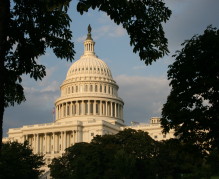Obamacare remains decisively unpopular with the American people, and most Republicans are staunchly committed to its repeal. And why shouldn’t they be? The ideological core of the bill runs contrary to the vision of limited government, market-based solutions, and individual choice that has formed the foundation of the party’s economic program since the statism of the First New Deal. Moreover, the party’s purpose is to win elections, and Obamacare still looks like a winning issue for the GOP.
Against the airtight ideological and political arguments for Republican repeal efforts, Democrats and their liberal allies in the mainstream media have resorted to variations on a single theme: Opposition violates our sacrosanct political traditions. The Supreme Court upheld (most of) Obamacare; the president won reelection; ergo, continued efforts to undo the health law, especially those to defund it, are in grossly poor form. As Harry Reid so gracefully tweeted last week: “We will not bow to Tea Party anarchists who deny the mere fact that Obamacare is the law.” According to Reid, the effort to defund this particular law is tantamount to opposition to the concept of law itself.
The position that leftists have adopted here is absurd, for two reasons. First, the notion that Obama’s reelection in 2012 was a plebiscite on the relative merits of Obamacare is wishful thinking. American elections are rarely, if ever, plebiscites. Politicians work to make elections about a whole host of things; more often than not, electoral campaigns scrupulously avoid the big issues of the day. It is much better, from the politicians’ perspective, to turn the election into a contest of personalities or valence issues, those on which the public concurs.
And so it was in 2012. Barack Obama hardly uttered a word about Obamacare, and ditto Mitt Romney, who presumably was afraid of Obama’s rejoinder that the law was based on what Romney did as governor of Massachusetts. The 2012 election was no more about Obamacare than it was about immigration reform, cap and trade, tax reform, or anything else. The dominant theme from Obama’s side was that Romney was a corporate raider, a type whom most everybody despises. From Romney’s side, it was the claim that he could help create jobs, something everybody loves. Obamacare—just like cap and trade, gun control, immigration, and many other issues—was left on the sidelines. That was a shame for Republicans. The exit polls showed a plurality of voters opposing the president’s health care law; that suggests, more than anything, a failure of Team Romney to turn the election into a plebiscite on the law.
Second, the implication from Democrats that once a bill becomes a law, it is as indelible as the Ten Commandments, etched into rock by the hand of God Himself, is precious when we consider the source. The Democrats, after all, mounted a 10-year campaign against the “Bush tax cuts,” and did so despite defeat after defeat on the issue. Those tax cuts joined a long line of laws that the country later substantially revised or repealed entirely. A partial list includes: the Clinton tax increases, portions of the Reagan tax cuts, the Gulf of Tonkin resolution, portions of the Kennedy tax cuts, the gold standard, portions of the National Labor Relations Act, Prohibition, the direct election of senators, the Sherman Silver Purchase Act, innumerable tariff schedules set during the 19th century, the three-fifths clause, the Kansas-Nebraska Act, the Missouri Compromise, the Second Bank of the United States, the original rules of the Electoral College, the Articles of Confederation, and, of course, the rule of King George III.
The Second Bank of the United States is a particularly instructive case. There, Andrew Jackson effectively did away with the bank not by repealing the law outright, but rather by defunding the institution, stripping it of its federal deposits and sending them to his cronies in state banks. No less a liberal eminence than Ted Kennedy cited Jackson’s bank veto message in his famed “The Dream Shall Never Die” speech at the 1980 Democratic convention. But as Democrats gather for their annual Jefferson-Jackson Day Dinners to complain about the perfidy of Republican efforts to defund Obamacare, it is unlikely they’ll mention the actions of their party’s founder. Also likely to be left unmentioned is Harry Reid’s flirtation with the movement to defund the Iraq war.
Far from giving up, Republicans need to redouble their efforts to repeal and replace. That requires a robust debate within the party on the best political strategy (not to mention the best candidates to present the case against the law) as well as vigorous policy work to find solid and salable alternatives to Obama’s $1.4 trillion boondoggle. That Democrats are claiming the Republicans have violated unwritten laws about political probity is actually the surest sign yet that the Grand Old Party is on the right track.
© 2013 by The Weekly Standard. Reprinted with permission.
